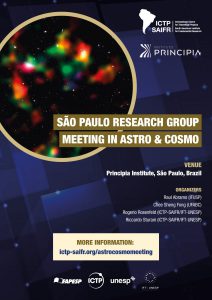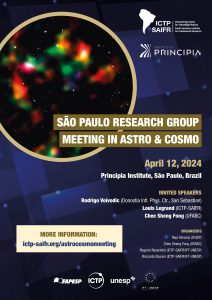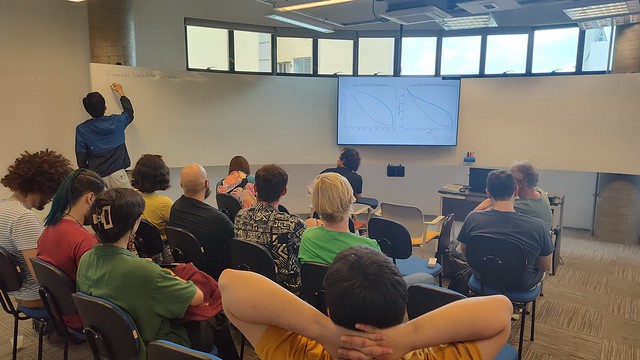São Paulo Research Group meetings in Astro & Cosmo

Next meeting: November 28, 2025
São Paulo, Brazil
Venue: Instituto Principia
Home
If you want to receive mailings about the meetings, click HERE.
Organizers:
- Raul Abramo (IFUSP)
- Chee Sheng Fong (UFABC)
- Rogério Rosenfeld (IFT-UNESP)
- Riccardo Sturani (IFT-UNESP)
Announcement:
Invited Speakers
- 10:00 Rainer Menote (UFES): CosmoDC2_BCO: A Gateway to Multi-Messenger Cosmology
In this talk, I introduce CosmoDC2_BCO, a synthetic multi-messenger catalog developed by embedding GW events and their EM counterparts into the LSST-DESC CosmoDC2 simulation. The framework includes source parameters, SNRs, parameter uncertainties, sky-localization areas, and kilonova magnitudes across LSST bands. I then present analyses that use these datasets to forecast GW–EM detection efficiencies, parameter degeneracies, and the cosmological reach of future third-generation detectors. Together, these results demonstrate how realistic end-to-end simulations can advance standard-siren cosmology toward the precision era.
- 11:15 Tabata Aira (INPE): Exploring the Origins of Glitches in the LIGO Detectors Using Machine Learning Techniques
- 14:00 Germán Lugones (UFABC): New Stable Branches of Compact Stars Beyond the Maximum-Mass Turning Point
Compact stars lying beyond the maximum-mass turning point on the mass versus radius curve are usually regarded as dynamically unstable, based on the assumption that any Lagrangian fluid perturbation preserves instantaneous beta equilibrium. However, we show that when chemical equilibrium cannot be re-established during disturbances, previously overlooked sequences appear in models of purely hadronic stars, hybrid hadron–quark stars, and self-bound quark stars. Along these extended branches, linear-response calculations yield positive squared eigenfrequencies for the fundamental oscillation mode, confirming stability well past the classical mass peak. We discuss the microscopic mechanisms that suppress the growth of perturbations. Finally, we outline potential observational signatures and astrophysical implications of such configurations.
Previous Meetings
- 11:15 Pedro Henrique Rossetto (USP): Continuous Gravitational Waves from Neutron Stars Magnetic Mountains – Video
- 14:00 Joaquin Armijo (USP): Cosmological constraints from the first year data of the Hyper Suprime-Cam – Video
- 11:00 Alexandre Le Tiec (IFT-UNESP — CNRS): What’s in a Name: the Anthropocene – Video
- 14:00 Fernanda Lima (IF-USP): Ultra-light dark matter and power spectra emulators – Video
- 15:15 João Ferri (IF-USP): What can we gain from small scales in shear analysis? A comparison between Fourier and Real spaces. – Video
- 10:00 Walter Riquelme (IFT-UNESP): Imprints of Large-Scale Structures in the Anisotropies of the Cosmological Gravitational Wave Background – Video
- 11:15 Ricardo Medina (UFEI): Determining self-force corrections to the equation of the separatrix of a Schwarzschild black hole – Video
- 14:00 Gustavo Figueiredo Severiano Alves (IF-USP): Chasing Serendipity: Tackling Transient Sources with Neutrino Telescopes – Video
-
-
- 10:00 Pedro Bittar (USP): Baryogenesis just around the corner: Generating the matter asymmetry at or below the weak scale – Video
- 11:15 Rodrigo Voivodic (Donostia Int. Physics Cent. San Sebastian & IFT-UNESP): Likelihoods – Video
- 14:00 Gustavo Henrique dos Santos (UFABC): ACT Constraints on Low Scale Inflation and a Mechanism for Vector Dark Matter Production – Video
-
-
-
- 10:00 Parth Bambhaniya (USP): Are We Sure It’s a Supermassive Black Hole at the Heart of Our Galaxy? – Video
- 11:15 Natalia Villa Rodrigues (USP) : Modeling halo bias with neural networks – Video
- 14:00 Vitor Sampaio (UNICID): Disks and Spheroids across cosmic time: Morphological and Star Formation Evolution of Galaxies from z = 2.4 to z = 0.2 – Video
March 14, 2025
-
10:00 Jorge Luiz Meléndez Moreno (IAG, USP): Solar Twins and their implications for Planets, Stars and the Galaxy – Video
Participants List: Here
2024
November 8, 2024
- 10:00 Abdias Aires (IFT-UNESP): Mitigation of nonlinear galaxy bias with theoretical-error likelihood – Video
- 11:00 Giorgio Torrieri (Unicamp): Non-local effective field theory in general relativity – Video
- 14:00 Daniel Lopez-Cano (IF-USP): Machine Learning Applications in Cosmology: Past, Present, and Future – Video
Participants List: Here
October 11, 2024
- 10:00 Walter Riquelme (IFT/UNESP): Unveiling the initial conditions of the universe with galaxy surveys – Video
- 11:00 Yago Porto (UFABC): Flavor Matters, but Matter Flavors: Matter Effects on Flavor Composition of Astrophysical Neutrinos – Video
- 14:00 Lilianne Nakazono (USP): Searching for quasars in the era of large multi-wavelength datasets – Video
Participants List: Here
September 13, 2024
- 10:00 – João Victor Silva (IFT UNESP): Dynamical Dark Energy and Massive Neutrinos in Light of DESI 2024 BAO – Video
- 11:00 – Lia Doubrawa (IAG USP): Galaxy clusters in photometric surveys: detection and analysis – Video
Participants List: Here
August 16, 2024
- 10:00 – Edivaldo Moura Santos (USP): The ultra-high energy cosmic ray sky – Video
- 11:00 – João Vitor Dinarte Ferri (USP): A cosmic standard ruler from the cross-correlations of galaxies and dark sirens – Video
- 14:00 – Natali de Santi (USP São Carlos): Cosmology with graph neural networks – Video
Participants List: Here
June 14, 2024
- 10:00 – Nickolas de Aguiar Alves (UFABC): Don’t forget about the memory
- 11:00 – Reinaldo de Carvalho (UNICID): Studies on Galaxy Morphology: Diving into the Primordial Era
- 14:00 – Isabela Santiago de Matos (IFT-UNESP): Cosmological tests with bright and dark standard sirens
Participants List: Here
May 10, 2024
- 10:00 – Lucas Gabriel Silva (IAG USP): Galaxy cluster mass estimation using the splashback radius
- 11:00 – Adriana Valio (Mackenzie): Exoplanetas: atmosferas e habitabilidade
- 14:00 – Carol Guandalin (Institute for Astronomy (IfA), University of Edinburgh): I see bispectrum everywhere
April 12, 2024
- 10:00 – Rodrigo Voivodic (Donostia Intl. Phys. Ctr., San Sebastian): The Hybrid Lagrangian Perturbation Theory
- 11:00 – Louis Legrand (ICTP-SAIFR): Next generation galaxy and CMB surveys: optimal estimators and cross-correlations
- 14:00 – Chee Sheng Fong (UFABC): How much baryon asymmetry and dark matter can be generated from primordial black holes?
Announcement:
-
Photos
Additional Information
How to reach the Principia Institute: The meeting will be held in the first-floor auditorium of the Science Center at Principia Institute located at Rua Pamplona, 145 near the Trianon-Masp metro station.


